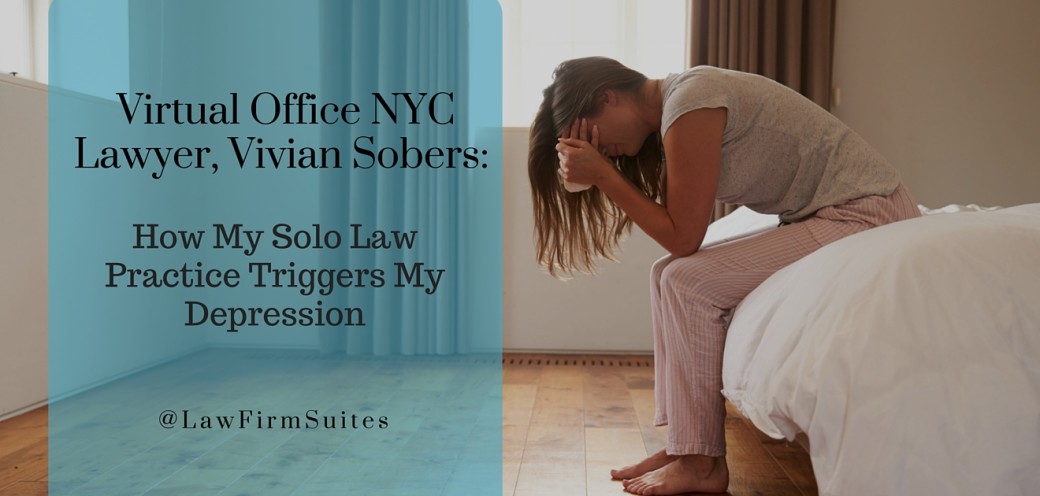Virtual Office NYC Lawyer, Vivian Sobers, discusses the prevalence of depression in the legal community and shines a light on her own experiences.
It is no secret that I expose myself to potential criticism on a consistent basis, both as an attorney and blogger; however, this blog article, in particular, makes me a little nervous to discuss…even more so than the recent article about my divorce.
Despite my nervousness, I felt it was important to discuss a topic that affects me personally and professionally: depression.
Depression is a condition that does not discriminate. But it is unsettlingly common in the legal profession.
According to a recent study, lawyers are 3.6 times more likely to deal with depression as opposed to non-lawyers. We also rank fourth in suicide rate when compared to other occupations, following dentists, pharmacists and doctors.
These statistics have influenced my decision to share how I am affected by depression.
I deal with depression on a consistent basis.
I suffer from bouts of depression about once a month on average, but they tend to be mild. I’d describe it more so as a feeling of moroseness, as though the weight of the world is crushing me and I begin to doubt everything I do and question whether I’m good enough.
My personality changes too. I become irritable and tend to shut out the world.
I’ll be honest, if I don’t have to be in court or meet with a client and I am dealing with an episode, I may go days without seeing or interacting with anyone. Doing otherwise can really feel as though it is all too much.
The solo attorney lifestyle can contribute to depression.
If you are susceptible to depression, the solo practice lifestyle can contribute to depression. Practicing as a solo can, at times, be just that: Solo.
As a solo, particularly if you run a virtual law office like me, you are alone most of the time and this is definitely a contributor to one’s mentality.
Joining a community of lawyers like the one I have through Law Firm Suites definitely helps eliminate some of the isolation, but even surrounded by other lawyers, I think solo attorneys tend to submerge themselves in their solo world, and that can be very taxing on one’s psyche.
I have learned that being a solo entails a whole different element of stress as opposed to someone who is employed by a firm.
As an attorney, there is often an element of overwhelm and expectation. And as a solo you have to deal with it alone. The upside of being solo is that, other than your clients, you have no one to answer to, but you also frequently have no one to lean on. You are solely accountable for anything that happens.
That can be a lot of pressure, and in many ways, we can be our own worst enemies.
The solo attorney lifestyle can easily contribute to depression Click To TweetHow my solo practice triggers my depression.
In my own personal experiences, each bout of depression varies. Sometimes I notice I’m feeling depressed and other times I don’t notice at all.
My bouts with depression are typically more prevalent the busier I get. For me, there’s a link with the increased responsibility as my case load goes up.
There isn’t specifically one trigger or contributing factor that triggers my depression, it’s more an accumulation of factors. Whether it is a day of 70 e-mails and 40 phone calls or a full day in court, it all adds up to being stressed out by the end of the day.
My most recent and difficult experience with depression happened a couple of weeks ago. That took a couple of weeks to get through.
But I still have a job to do.
As attorneys we are expected to be professional at all times. The downside is that we must always leave our personal troubles at the door. We are expected to perform without interference of personal emotion.
I wear a suit of armor for my clients because I know that what I am feeling shouldn’t affect my work.
I wear a suit of armor for my clients Click To TweetDealing with depression in my own way.
Since my depression is mild, I use my own personal methods for dealing with it. Going to the gym helps me a lot. It’s a good stress relief and helps keep me focused.
I also talk to friends frequently.
Speaking with friends who I trust allows me to just let everything out freely, and for the most part, I feel better when I feel I can do this.
My hope is that I was able to shine a little light on this subject, and hopefully my story can make someone else recognize that they are not alone.
Have you dealt with depression as an attorney? Comment below and give us your thoughts.





on said:
First of all, I am not a lawyer and I am very much interested in helping lawyers manage their stress and in turn symptoms like depression.
One question I have is that, nothing you have mentioned specific to lawyers. It seems like people working solo and extremely busy in any other profession would have similar problems. I haven’t got a chance to read the article you have linked yet; I’ll definitely do that and may have answer to my question above.
I also wonder how much being in a law firm would help. There would be different kinds of stressors. I would think taking time to build and sustain relationships to lean on in an extremely busy work life would be a problem in either case.
It is great that you go to the gym, exercise is excellent solution; plus, writing and reaching out to help others seems like a great coping mechanism. How much sharing your about your situ in this blog helped you? I noticed just wrote this or published this today.
BTW, have you tried participating in outdoor activities? Hiking or biking instead of indoor gym. Water activities swimming and kayaking helps me. I don’t know what is possible space and time wise.
Other than virtual community, have you thought of starting a “meetup” (www.meetup.com)?
It seems your attitude to deal with your problem is a great asset.
Good luck!
on said:
A brave article. Thank you for sharing. Depression is a very real issue that plagues many attorneys. In fact, my husband and I discussed this matter recently. He attended a course regarding client interaction. The instructor, a psychologist, explained that attorneys’ bouts of depression are often attributed to the way we are trained. The issue-spotting that we learn in law school and apply in practice trickles into our personal lives. And for that reason, we’re never happy (or rather have a tendency not to be). So the cure? Positive thinking. It sounds cliché, I know. But it works. Instead of focusing on the slow periods, be happy that you have time to pamper yourself, meditate, or vacation without permission. Of course, it’s a struggle. But searching for the silver lining in life is way more rewarding than spotting the issue.
on said:
Thanks Demia for your input. I totally agree. Martin Seligman, a psychologist, describes it as a “Pessimistic” explanatory style. His book is “Learned optimism” and shows a practice referred as “ABCDE” that allows us to change pessimistic style to an optimistic style.
You can also check out this article he wrote:
http://www.lawyerswithdepression.com/articles/why-are-lawyers-so-unhappy/
Hope we can reduce depression in lawyers’ practice and enable them to be passionate about what they do.
on said:
Thanks for posting the article link! It was really informative. I ordered Dr. Seligman’s book “Learned Optimism” today, and look forward to reading it. I plan to post a review once I get through it!
on said:
Would love to hear your thoughts after you have read, Stephen. It seems like we have some common interests and overlapping missions.
shabbir
on said:
I have owned and operated a small law firm for 7 or so years. I started this because I had worked at a firm and had a serious bout of depression that significantly impacted my work and ultimately led to me missing a limitation date and getting sued. I felt that one of the partners was to blame for constantly leaving work for me that was in crisis, so I was continually having to reprioritze my own files on deal with his emergencies. I quit that job and spent a month in bed.
Not wanting to be faced with a situation like that again, I decided I was better off on my own. I found that my depression got much better when I had more control of my workload – until recently…
My spouse developed a drinking problem. I was forced to separate and eventually a Child Welfare intervention sent me down the road of being a single parent of a (wonderful) 5 year-old daughter. My daughter is only allowed supervised visits with her mom.
I was strong at first, but eventually depression hit again. Combined with the overwhelm, my practice fell into shambles. I was able to find treatment, but by he time I started feeling better, I had completely failed my clients and am now possibly going to be suspended or disbarred.
What I have observed in both of my serious episodes of depression was that there appears to be a lack of education and understanding about mental illness in the profession and in the judiciary. The expectation that lawyers be strong, in my opinion, comes even more from the bar and the bench as it does from the clients. I believe the profession needs a culture shift in that regard – some professional courtesy and understanding would have helped my situation a lot.
As an example, a lawyer who knew I was having personal problems brought an application to strike one of my client’s lawsuits. Due to improper service and an email malfunction, I didn’t get actual notice of the application until after the lawyer got an order in my absence. He wouldn’t consent to set it aside even with an offer to pay costs. Then, I just missed the deadline to appeal. I couldn’t deal with it. I felt hopeless, frustrated, overwhelmed and had impossible writer’s block. My depression made the task seem way bigger than the was. Instead of working on an appeal, I would sit and play Candy Crush for hours, feeling guilty that I wasn’t working on it.
My insurers tried to save the lawsuit. They brought an application to the Court of Appeal to extend the deadline for appealing the order. The Court of Appeal, without any specific evidence showing prejudice to the other parties, declined to grant an extension absent a medical report showing my condition made it “impossible” for me to file the appeal on time.
So, my experience has been that depression has affected me equally in a firm setting as it has as a sole practitioner. I think the profession’s intolerance towards it makes it so difficult and ends up compounding the problem. All the more troublesome is that, in my jurisdiction at least, depression is a mental disability that is protected under Human Rights legislation. I would have expected more from my colleagues, peers and the judiciary to recognize and understand hat depression can be a debilitating illness.
Anyhow, thank you for this great article! It’s nice of know I’m not alone.
on said:
Thanks for your honest and frank comment Toby. I think discussing these issues openly is the best way to encourage change.